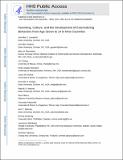Parental Acceptance-Rejection and Child Prosocial Behavior: Developmental Transactions across the Transition to Adolescence in Nine Countries, Mothers and Fathers, and Girls and Boys

View/
Publication Date
2018Author
Diane L Putnick, Marc H Bornstein, Jennifer E Lansford, Lei Chang, Kirby Deater-Deckard, Laura Di Giunta, Kenneth A Dodge, Patrick S Malone, Paul Oburu, Concetta Pastorelli, Ann T Skinner, Emma Sorbring, Sombat Tapanya, Liliana Maria Uribe Tirado, Arnaldo Zelli, Liane Peña Alampay, Suha M Al-Hassan, Dario Bacchini, Anna Silvia Bombi
Metadata
Show full item recordAbstract/
Promoting children’s prosocial behavior is a goal for parents, healthcare professionals, and
nations. Does positive parenting promote later child prosocial behavior, or do children who are
more prosocial elicit more positive parenting later, or both? Relations between parenting and
prosocial behavior have to date been studied only in a narrow band of countries, mostly with
mothers and not fathers, and child gender has infrequently been explored as a moderator of
parenting – prosocial relations. This cross-national study uses 1178 families (mothers, fathers, and
children) from 9 countries to explore developmental transactions between parental acceptancerejection and girls’ and boys’ prosocial behavior across three waves (child ages 9 to 12).
Controlling for stability across waves, within-wave relations, and parental age and education,
higher parental acceptance predicted increased child prosocial behavior from age 9 to 10 and from
age 10 to 12. Higher age 9 child prosocial behavior also predicted increased parental acceptance
from age 9 to 10. These transactional paths were invariant across 9 countries, mothers and fathers,
and girls and boys. Parental acceptance increases child prosocial behaviors later, but child
prosocial behaviors are not effective at increasing parental acceptance in the transition to
adolescence. This study identifies widely applicable socialization processes across countries,
mothers and fathers, and girls and boys.
Collections
- Department of Psychology [216]
